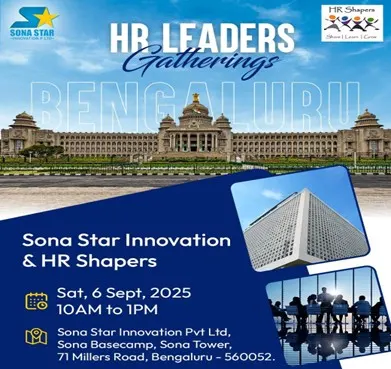 Accredited NAAC A++
Accredited NAAC A++

The HR Round Table conference at Sona Towers, Millers Road on 6th September 2025 was organized on the topic “Leadership Development for an AI-Augmented Workforce” between 10.30 am and 1.00 pm.
The rise of Artificial Intelligence (AI) is reshaping the world of work, creating both opportunities and challenges for organizations. While machines are taking on repetitive, data-driven, and analytical tasks, the human workforce is being pushed toward higher-order skills—creativity, emotional intelligence, strategic decision-making, and adaptability. This shift demands a rethinking of leadership development, as leaders must learn to guide AI-augmented teams where humans and technology work in synergy.
Dr. Venugopal, Vice President, Sona Star Innovation Private Ltd, introduced Sona Institutions, its history, and legacy.
Mr. Thyagu Valliappa, CEO of Sona Star Innovation Private Ltd, shared an overview of SCALE (Sona Centre for Advanced Learning and Entrepreneurship). He explained its purpose of collaborating with corporates to create a Global Capability Centre (GCC), identify industry experts, train students on emerging trends across Karnataka, and create opportunities for internships that can eventually lead to placements.
Mr. Ashish, Manager at HR Shapers, opened the program with an engaging ice-breaking session. He invited delegates to reflect on the question, “What gives us peace of mind at the end of the day?” Each participant shared their honest experiences, creating valuable perspectives, enjoyment, and greater group cohesion.
The summit convened nearly 40 distinguished HR leaders from the corporate world, who shared valuable insights and experiences on the expanding role of AI within organizations. Discussions highlighted that while AI continues to advance rapidly, the human element remains crucial, as managerial decisions require judgment, empathy, and context that technology alone cannot provide.
The discussions were on the following lines:
In an AI-augmented environment, leadership goes beyond traditional supervision. Leaders are required to:
Successful leadership in the AI era is not about replacing people with machines but about augmenting human potential. Leaders must champion a partnership model where AI handles data-driven precision, and humans contribute judgment, ethics, and empathy. This synergy enables organizations to remain competitive while sustaining a positive workplace culture
Some HR professionals also expressed the view that the traditional role of HR may diminish in the future, as AI is increasingly capable of handling many HR functions. They also pointed out that Gen Z employees often prefer not to work beyond regular hours, tend to avoid long stretches at work, and may not stay for extended tenures within companies.
In conclusion, while AI is reshaping the workplace by taking over routine and data-driven tasks, the true essence of leadership lies in leveraging technology to enhance human strengths rather than replace them. The evolving role of HR and the changing work preferences of Gen Z highlight the need for organizations to rethink strategies—balancing efficiency through AI with human-centered practices that foster flexibility, engagement, and long-term sustainability.